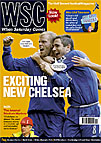 Malcolm Glazer may have been frustrated in his first attempt to take over at Old Trafford, but he and the United ownership saga are certainly not finished, as Adam Brown explains
Malcolm Glazer may have been frustrated in his first attempt to take over at Old Trafford, but he and the United ownership saga are certainly not finished, as Adam Brown explains
When the board of Manchester United announced at the end of October that they were breaking off talks with Malcolm Glazer, the American businessman attempting to take over the club, many assumed that this was the end of the matter. However, far from this being the “final nail in the coffin”, as one put it, there are a number of options left open to the owner of Tampa Bay Buccaneers. At least one of these scenarios should be sounding alarm bells in the minds of all football fans, for the future ownership of Manchester United will have implications far beyond Old Trafford.
At present, John Magnier and JP McManus, under the nom de guerre Cubic Expression – own 28.9 per cent of United; Glazer has 28.1 per cent; Scottish businessman Harry Dobson owns around six per cent; Celtic’s Dermot Desmond owns just short of one per cent; 18 per cent belongs to big investors; and the same amount is in the hands of small shareholders and fans.
Glazer’s initial bid was believed to be based upon an offer to buy out Cubic at somewhere around £3 per share. However, this offer was also thought to be conditional on Glazer being able to guarantee acquiring more than 75 per cent of the stock – a level that would allow him to restructure the company. This was vital to Glazer because he was borrowing around £500 million of the £800m buying price and it would be impossible under the current structure to service that level of debt.
However, Cubic were not interested in selling on a conditional basis and broke off talks. United followed suit, wisely citing the level of debt he would bring to the club as detrimental to the future of the company. This caused consternation with some City commentators and Glazer, who was reportedly furious, because the decision was not based solely on how fat shareholders’ pockets would become, but took into account the future of the company (other statements even mentioned the fans as “stakeholders”), and was an important and somewhat surprising step by the board.
Glazer’s problem was that his bank, JP Morgan, were unlikely to secure the funds unless United’s board recommended the takeover. If Glazer’s holding hit 30 per cent, the Stock Exchange’s Rule 9 would apply. He would have to offer to buy everyone else’s shares, showing proof of finance, at the highest rate he had paid for any shares in the previous year, in this case £2.85. With the Irish unwilling to sell on a conditional basis and Glazer unable to make a guaranteed bid, it left him, as one insider said, “outside the shop window, where he can see everything but can touch nothing”.
So, what now? The company is unstable, while Glazer has borrowed heavily to finance share purchases, so is losing money. If he sells up, the share price could slide, making other investors, and therefore the board, unhappy. The board could offset this by the company buying some or all of the shares and placing these in some form of trust, with fan involvement. With anything more than 25 per cent, this could stabilise the company, blocking any other predator by preventing any significant restructuring without the trust’s agreement. How likely the board is to do this is far from certain, but it’s something fans’ groups are now pressing for. It is the best hope, short term.
However, Glazer could come back with new finance to make an unconditional bid at around £3 a share – a level likely to make all but the fan shareholders sell up; a third party could come in and buy at similar levels; or he could be a “stalking donkey”, as one insider put it, for another bidder. Any of these scenarios should send shivers down the spines of United fans, fans of other clubs and the entire football establishment.
Someone borrowing £800m would need to find at least £70m a year just to service the debt; United currently return at best around £40m, so new revenue would be needed. Ticket prices could rise, but with ground expansions planned affecting supply and demand, the scope is limited. Merchandise income is at a near maximum given the huge deal with Nike that guarantees £25m a year. That leaves media income.
To significantly raise United’s media revenue, there would have to be an “unbundling” of rights from the current collective selling arrangements. This could be limited to the sale of overseas TV and internet rights, but more likely would be a wholesale rejection of collective bargaining and even league restructuring (allowing Cubic’s ally, Desmond, to lever Celtic into the equation) with big clubs going it alone, leaving the rest to scramble for the crumbs, as in Italy.
This is the doomsday scenario for not only the rest of the clubs in the Premiership, but also the Premier League itself (the collective deal being their raison d’être). Just as Murdoch and Sky used football as a battering ram to kick-start the satellite revolution, so other players need the most valuable content to kick-start broadband and other new media developments.
All of this could be put back in its box if football were properly regulated, with strict controls – as in Germany – over who owns football clubs. And it does not take into account the unanimous opposition of United’s fans who, increasingly militant, are already targeting commercial earnings and talking of “making the club ungovernable”as a warning to potential buyers. But it is clear that this is far from being all played out.
From WSC 214 December 2004. What was happening this month